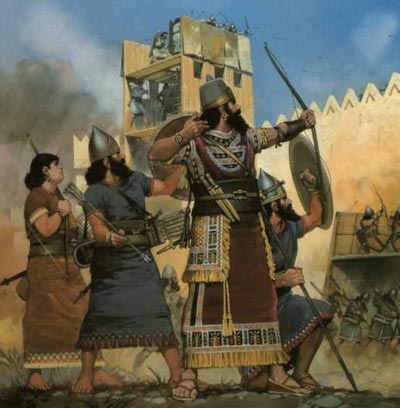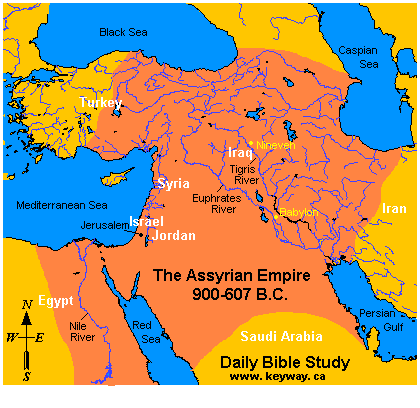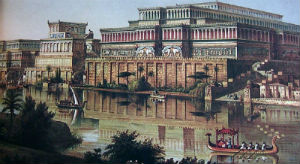A Tale of Three Cities
How imperishable hope was birthed in a time of troubles
By Neil Earle
Jerusalem, Samaria, and Nineveh – three cities of the ancient world well known to readers of the Bible. These three capitals were involved in a dynamic conjunction of international power politics and Bible prophecy. A prophet named Isaiah was sent by God to deliver sobering oracles of judgment and repentance to each of them.
Jerusalem was David’s City, the capital of ancient Judah. Samaria was the capital of Judah’s brother-nation, Israel, to the north. Nineveh (pictured, above) was the chief urban center of aggressive Assyria, far-off in the area of the Tigris River. It was sometime around 745 B.C., as the dreaded Assyrian shadow fell over the Middle East, that Isaiah was called to the prophetic office (Isaiah 6:1-3).

The Assyrian Thunderbolt
Isaiah’s appointment came in the nick of time. The rulers of Nineveh were on the warpath. “The growth of Assyria began about 1100 B.C. but the empire reached the height of its power only after 700 B.C. By that time the Assyrians held most of Mesopotamia, Syria, the Palestine coast, and Egypt. They enforced their rule by a deliberate policy of frightfulness, enslaving and torturing and killing thousands of captives” (Strayer, Gatze, and Harbison, The Course of Civilization: Volume One, p. 30).
Isaiah’s call to prophesy was the thrilling overture to this tale of three cities. He was to be proclaimer of repentance to three people groups. God loved Jerusalem, of course, his temple was there. But he was also concerned about the neighboring kingdom of Israel just to the north. These tribes had split off from Judah and Jerusalem generations before, just after the time of Solomon (1 Kings 12). Even fierce Assyria in their seemingly impregnable capital of Nineveh was not outside the scope of God’s love – a prophet named Jonah had been sent to them some years before (Jonah 1:1).
So, though Isaiah was based in Jerusalem, his call to repentance and hope would remind all who would hear that the God of Israel ruled in the affairs of men. This generous being stood ready to forgive (Isaiah 1:16-20). He would surely intervene for his people if they would turn to him in repentance and faith (Isaiah 2:5).
Isaiah’s name meant, roughly, “Yahweh is Salvation.” A skilled and passionate preacher, even though his prophecies often fell upon deaf ears (Isaiah 30:15-18). Isaiah gave shining visions of future hope that would far transcend his own day, visions of a Messiah who would appear to lead his people to lasting hope and security (Isaiah 11:1-5).

“The Assyrians are Coming”
Isaiah’s ministry thus coincided with “the most momentous events, more so than almost any period of Israelite history” (Lasor, Hubbard and Bush, Old Testament History, p. 279).
Here’s why. Assyria’s Tiglath-pileser came to power in Nineveh in 745 and by 740 had expanded into northern Syria. Israel’s king was forced to pay tribute (2 Kings 15:19). Soon, relentless Assyrian columns would slice across the upper Jordan region, seize Galilee and Gilead (Isaiah 9:1), and carry off many northern Israelites into captivity.
“The Assyrians are coming!” This alarm congealed the hearts of people in the Ancient Near East. Nations trembled at rumors that Assyria’s invincible army was on the prowl (Isaiah 5:26-28). Nineveh’s warlords employed calculated terror! One Assyrian leader boasted: “I stormed the mountain peaks and took them….The heads of their warriors I cut off, and I formed them into a pillar over against their city…I flayed all the chief men who had revolted” (Finegan, Light From the Ancient Past, p. 202-3).
Thus was the menace from Nineveh that threatened Samaria and Jerusalem. But Isaiah the Prophet was as relentless as the armies of Nineveh. He preached deliverance and hope. He knew that cruel Assyria was no match for the God of Israel.
In a daring prediction, the Judaean seer forecast the end of Assyria while the empire was at its peak: ”When the Lord has finished all his work against Mount Zion and Jerusalem, he will say, ‘I will punish the king of Assyria for the willful pride of his heart and the haughty look of his eyes’” (Isaiah 10:12).
The Spreading Shadow
But before the humbling of Nineveh, Isaiah’s God had a bone to pick with the complacent, idolatrous Israelites and the citizens of Samaria. The Israelites had played the slippery game of power politics and greedy commercialism like all the other nations and with little regard for basic decency and compassion (Amos 2:6-8). Isaiah’s predecessors had noted how the Samarians had trampled on the basic principles of social justice (Amos 6:1-7).
Inspired, Isaiah sang a “protest song” against Samaria’s moral and spiritual degeneration. His Ode to a Vineyard in chapter 5 got to the heart of the matter: “When I looked for good grapes, why did it yield only bad?” (verse 4). The vineyard was a symbol for Samaria but God was also calling Judah and Jerusalem to repent: “The vineyard of the Lord Almighty is the house of Israel, and the men of Judah are the garden of his delight. And he looked for justice, but saw bloodshed; for righteousness but heard cries of distress” (Isaiah 5:7).
The Doom of Samaria
“Now I will tell you what I am going to do to my vineyard,” God said. “I will take away its hedge, and it will be destroyed; I will break down its wall, and it will be trampled” (Isaiah 5:5).
That happened.
Samaria refused to heed the warning message, even when Jerusalem’s good King Hezekiah invited them to participate in ceremonies of national repentance. “People of Israel return to the Lord,” was the message (2 Kings 30:6). Samaria scorned it (verse 10).
Punishment was not long in coming. Assyrian King Shalmaneser V (727-722) and then Sargon II (722-705) swept into Israel on their way to trounce the Egyptians. Samaria was destroyed and leveled, her people uprooted (2 Kings 17). “Israel’s proud kingdom had fallen, no more to rise” (Old Testament Survey, p. 211).
By the dreadful arithmetic of justice it was one city down; two to go.
Nineveh’s Turn
Nineveh, Samaria’s nemesis way off in Mesopotamia, was described as “queen city of the earth, mighty and brutal beyond imagination, head of a warrior state built on the loot of nations. Limitless wealth from the ends of the earth poured into its coffers. [The prophet] Nahum likens it to a den of ravaging lions, feeding on the blood of nations” (Halley’s Bible Handbook, 24th Edition, p. 369).
Isaiah’s God decreed doom for Assyria and its capital, Nineveh: “Woe to the Assyrian, the rod of my anger, in whose hand is the club of my wrath! …The Lord, the Lord Almighty, will send wasting disease upon his sturdy warriors; under his pomp a fire will be kindled like a blazing flame” (Isaiah 10:5, 16).
That happened. Avenging armies from Babylon and Media finally closed the ring on proud Nineveh. In 612 B.C. the city was burnt, as Isaiah had foretold. The Assyrians had refused to repent. They had not learned the lesson that instruments of judgement can themselves be judged, that God rules in the affairs of men and that he expects repentance. Those are lessons not just for Isaiah’s time but for all time (Isaiah 46:8-10).
A Jewish Alamo!
Two cities down. One to go?
No. Not quite.
Heartfelt repentance works wonders. In Isaiah’s day, the century before Nineveh’s fall, the Assyrians under Sennacherib had reached the very walls of Jerusalem (2 Kings 18, 19). Jerusalem stood encircled like a Judahite Alamo (Isaiah 1:7-9). But Judah’s king, the righteous Hezekiah (716-687), had learned from Samaria's fall. He respected the God of Israel (2 Chronicles 30:13-18). He prayed a prayer of repentance for him and his people: “May the Lord, who is good, pardon everyone who sets his heart on seeking God” (2 Chronicles 30:19).
Hezekiah refused to be cowed by the taunts of Sennacherib’s army. Inspired by Isaiah’s reassurances (Isaiah 37:21-29), he turned to God in repentance and faith : “It is true, O Lord, that the Assyrian kings have laid waste these nations and their lands…Now O Lord our God, deliver us from his hand, so that all kingdoms on earth may know that you alone, O Lord, are God” (2 Kings 19:17-19).
The results were momentous. Both biblical history (Isaiah 19:35-36) and secular archaeology hint at a setback during Sennacherib’s last campaign. The Taylor Prism in the British Museum records Sennacherib’s boast of shutting up Hezekiah in Jerusalem “like a bird in a cage.” But…it contains no record of the fall of Jerusalem. To many scholars this is evidence that Sennacherib faced an embarrassing setback outside Jerusalem (Finegan, p. 213).
The Messianic Hope
The defeat of the Assyrians after the repentance of King Hezekiah and his people saved the city of Jerusalem. It illustrated Isaiah’s theme wonderfully. “In repentance and rest is your salvation, in quietness and trust is your strength” (Isaiah 30:15).
Yes, Isaiah’ s tale of three cities is more than a quaint historical survey. By God’s superintending providence, Isaiah’s predictions pointed beyond his time. From the royal line of King David, represented by righteous King Hezekiah, would come an even mightier Deliverer (Isaiah 11:1-10). Out of the land of Galilee enfolded in Assyrian darkness there would one day come a great light (Isaiah 9:1-2). The national healing promised in the days of Hezekiah would be the prototype for a miracle-working Messiah (Isaiah 35:5-6).
Christians believe these prophecies were fulfilled in the ministry of Jesus of Nazareth, the prophet from Galilee. Jesus was born of a virgin as Isaiah had intimated (Isaiah 7:13-17). He was set forth as the ultimate Deliverer of his people. Jesus revealed himself as the ultimate fulfillment of the hopes of his people Israel (Matthew 23:37).
But Jesus, like Isaiah, also warned of judgement for people and nations who will turn to God in repentance and faith. “Unless you repent, “ he warned, “you too will all perish” (Luke 13:5). Judgement then and judgement now. God does not change. The God of Isaiah, the God who sent Jesus, stands ready to bless us if we change but to call for judgment if we forsake his ways. The tale of three cities is a powerful message for today.
